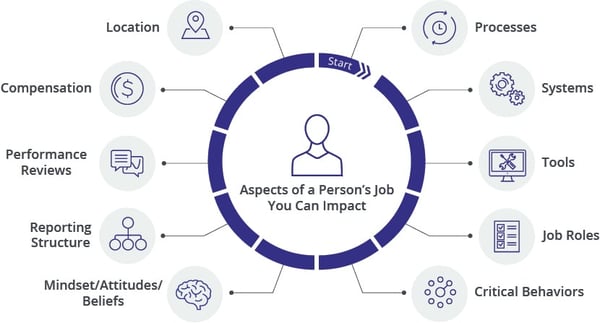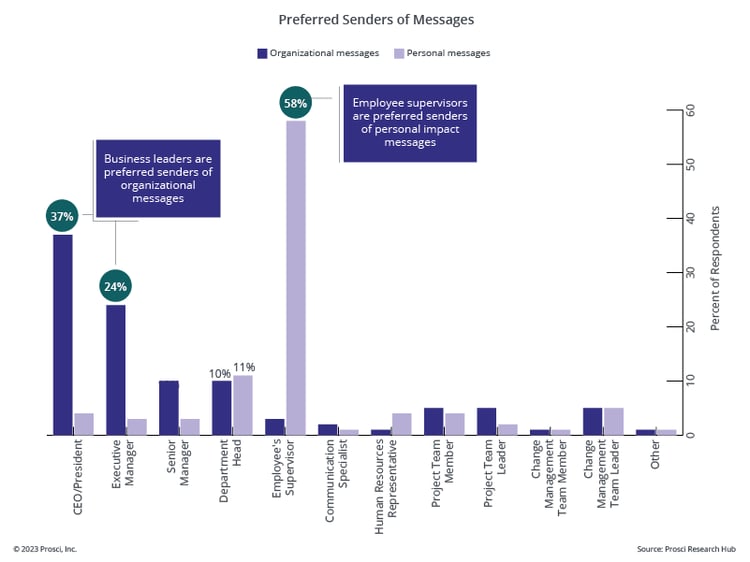How to Lead Change Effectively During Uncertainty

3 Mins
Updated: March 3, 2024
Published: October 11, 2023

Managing change during uncertainty can cause us to feel overwhelmed and powerless. But grounding our thoughts in what we already know about effective change can unlock creativity and the ability to problem-solve in our brains. Grounding our thinking is also a powerful, psychological way to direct our thoughts away from stress and create a sense of calm and control. This paves the way for more thoughtful actions and better results from change.
Ground Yourself in What You Know About Change Management
Whenever you face a stressful and uncertain change, it can be easy to focus too much on the difficulties ahead and lose confidence in your ability to deliver change management effectively. To reframe the situation and set yourself up for success, try to ground your thoughts in these three fundamental “Change Is, People Do” declarations about people and change:
1. Change is challenging, and people do resist change
Change is often challenging because of uncertainty, risk and fear. Going from a comfortable current state to something new and different causes discomfort in social structures, our established habits, working norms, and even our psychological safety. This naturally leads to resistant behaviors, which are normal and expected during change. People resist change in many ways, ranging from quiet indifference and workarounds to recruiting dissenters and intentionally sabotaging projects.
2. Change is a process, and people do need to understand why
We can’t flip a switch and expect people to know what is changing and how to change. We need to help them through the transition from their current state to their future state. When you tell people their job will be impacted by a change, you must also explain how all of the aspects of their job will be impacted. You must explain the current-state process and future-state process, current-state location and future-state location, and so on. This is what people need. And they need to know the why behind the change. Why are we changing? Why this? Why now? What happens if we don’t change?
Prosci's 10 Aspects of Change Impact

3. Change is individual, and people do need change leadership
We can’t talk about individual change without talking about ADKAR, which is an acronym for the process we know everyone goes through during change: Awareness, Desire, Knowledge, Ability and Reinforcement. To effectively build Awareness and Desire, we need specific individuals and roles in our organization to act, so we can achieve critical individual process milestones. Who are the change leaders? Prosci Best Practices in Change Management research tells us that senior leaders are the preferred senders of organizational messages and people managers (direct supervisors) are the preferred senders of personal impact messages.

Adaptive Action Framework
in Change Management
Another thing we know about people and change is that successful change can be unlocked. This is where an elegantly simple framework called Adaptive Action can help. Detailed in Adaptive Action: Leveraging Uncertainty in Your Organization, by Glenda H. Eoyang and Royce J. Holladay, the Adaptive Action framework can be applied to these “change is, people do” declarations to help us identify precisely what our next, best steps should be.
The Adaptive Action model comprises three basic questions: What? So what? Now what?
- "What" asks about the current situation. What are you observing? What’s happening?
- "So What?" asks what meaning or conclusions we can draw. What's our reflective thinking on what's happening?
- "Now what?" is the action part. What actions can we take to address the implications?
In addition to being easy to understand, the Adaptive Action framework enables us to use change management processes, structures and plans to reassess, course-correct, and adapt as needed very quickly.
Consider our statement, “Change is challenging, and people do resist change.” How might we take Adaptive Action?
1. First ask, “What?” What about this change is so challenging? Maybe the challenge has nothing to do with the people side of change. It could be the solution itself—the technical side of what we’re designing, developing and delivering. Or the way the change is being brought to life, such as the Agile or another iterative approach.
2. Now let’s reflect on that by asking, “So what?” What are the implications of your observations about the “What” you observed? Why is change so challenging? Why do people resist it? Maybe the problem is that Agile and iterative approaches are new to your organization. People exhibit resistance behaviors because they’re unsure about the iterative impact to their day-to-day work and how they will be supported through the change process.
3. Finally, ask, “Now what?” What actions can you take immediately to address what’s going on? For our Agile example, we might share visuals that help impacted groups understand the eventual end state beyond incremental releases. We can also reinforce key messages and benefits. And we can engage sponsors and people managers to advocate for the change, setting clear expectations for their teams.
Change Management
in Times of Uncertainty
As change leaders, we can address nearly any change challenge when we have the right knowledge, skills and tools. Combining what we already know about people and change with the Adaptive Action framework helps us adopt an action-oriented mindset, unlock problem-solving and creative areas of our brains, and make grounding connections. This helps us feel more comfortable, calm and in control while effectively leading others during complex and uncertain times of change.


